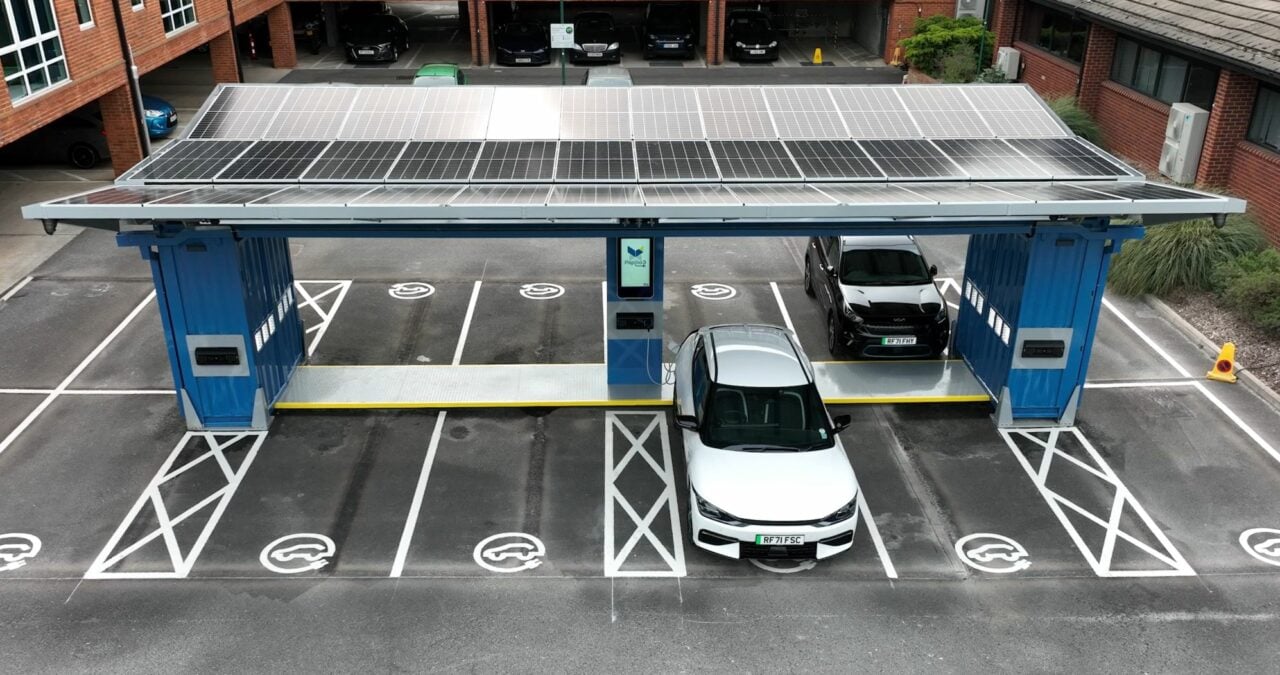
The Papilio3 has three canopies that can support 36 solar panels. Image: 3ti.
British solar carpark developer 3ti has launched a pop-up mini solar car park, dubbed Papilio3.
The modular unit combines solar PV with battery energy storage, and can be used to power up to 12 fast electric vehicle (EV) chargepoints. Each unit can be rolled out in 24 hours, and is made from recycled shipping containers.
Each Papilio3 has three modular canopies that support 36 solar panels, as well as a battery storage capacity of up to 250kWh.
The units are designed to be rolled out at workplaces and public destinations such as hospitals, hotels, meeting venues, sports or shopping centres, tourist attractions and town centres. They can support a mixture of a mixture of 7kW, 11kW and 22kW chargers.
“We believe that solar and battery boosted destination and workplace charging will become the best EV charging solution for drivers, irrespective of the type of home they live in,” said Tim Evans, 3ti founder and CEO.
“By utilising dwell times of several hours, when cars are parked at work or when the driver is visiting a shopping or leisure venue, for example, 3ti’s system ensures that EVs can achieve a level of charge that covers day to day driving needs and does it in the most low carbon way.”
Combining solar, battery storage and EV charging can help reduce energy costs by helping to avoid using the grid during peak times, giving businesses greater control over energy supply, according to 3ti.
Papilio3 units are provided on a monthly rental basis by the company, meaning there is no up-front capital cost. The units are designed to minimise the number of planning approvals and investment requirements needed to install solar and EV chargers.
The first Papilio3 unit was unveiled at Surrey Research Park in Guildford on Friday 27 May. The site is part of the University of Surrey, and home to over 200 businesses, including the likes of Airbus and BAE Systems.
Evans said: “Allowing businesses to generate renewable energy right outside their front door not only gives them greater control of energy costs, it also makes a huge statement to customers and visitors that they are serious about tackling climate change and reducing carbon emissions. By deploying fast charge points, up to 12 at a time, with Papilio3, we will provide much needed, cost effective charge point infrastructure and expand the UK’s network of public EV charge points.”
Solar carparks are increasingly popular in the UK, as companies look for ways to ease the rollout of EV charging infrastructure. Typically a solar carpark with 350 spaces will be able to produce around 900,000kWh of electricity a year over a 30 year period, said 3ti.
Currently there are around 20,000 public car parks with 4 million parking spaces, in addition to 9 million workplace parking spaces. If 3kWp of solar was installed per parking space, there would be 39,000MWp of installed capacity. This is enough to meet 140% of the UK’s annual electricity demand, and could therefore ease the increased electricity demand from EV adoption.
In 2021, the UK’s first solar-power Park and Ride opened in Leeds with a capacity of 1.136MWp, as West Yorkshire Combined Authority looked to ease the rollout of EV infrastructure.
Similarly, Cambridgeshire County Council announced plans to build a 2.5MW solar carport with battery storage in 2020.

